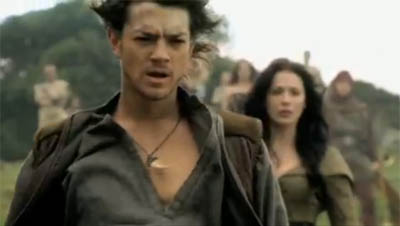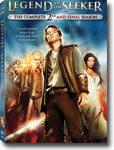 |
|
|||||||||||||||||||||||||||||||||||||||||||||||||||||||||||||
 Season two of Legend of the Seeker Season two of Legend of the SeekerWhen the Boxes of Orden were broken, thereby killing Darken Rahl, Richard the Seeker unknowingly tore a rift in the veil separating the world of the living from the world of the dead. Now the underworld's minions (banelings) are seeping into the world, intent on killing all living beings to broaden the ranks of the Keeper of the Underworld. Knowing now that this catastrophe was his fault, Richard has taken it upon himself to turn the world over to find the one thing that might save them all: The Stone of Tears. As is the way of such things, it is a race against time himself, for as Richard seeks the Stone, the fissures opening the Underworld spread. To complicate matters, Richard learns of his true heritage, so he wages war on his own soul while fighting to save the souls of every person left in his world. If all of this were not enough, there is new prophecy (and another, and another) that says that Richard will fail this time - and with a woman who is not his Confessor and love. When Zedd sees the prophecy begin to come true, the fear is predictably palpable. The prophecies that the Seeker will fail are constant and continual through this new quest. It does get more than a little tedious. However, banelings (anyone dead can now strike a deal with Lord Rahl to come back to life, assuming they are willing to kill daily for the Keeper once they walk on land above) make for an interesting murder mystery to be solved. A continual girl-fight struggle over Richard's heart and loyalties adds a tawdry aspect. Wizard fire adds the flash that today's television demands. And the honorable save-the-world quest warms the hearts of even the most cynical viewers. Layers upon layers of plotting, going back generations, are so very convoluted yet consistently lead back to one common ploy: power, more power and ruling the world. It is very basic, when boiled down, and splits off entirely from the story Terry Goodkind tells. Magic wraps more magic upon even more to bend the world to the will of the Wizard, making us wonder if he can do that, what need is there for questing? There are many obvious holes, many with Darken Rahl (how did he stay alive while Richard was using the Power of Orden, given what he is?). In a world where corny clichés win the biggest battle, we definitely would have been better off if they had taken less literary license with the original tale. The trio from Season One fluctuates here and there. Cara, no longer welcome among the Mord'Sith sisters, has joined their ranks to protect Richard and to put up with Kahlan and Zedd. There are random stragglers who cling once in a while: Flynn, who inadvertently becomes a tool in finding the Stone of Tears; Leo, the interim Seeker; a random assortment of Sisters; and even Darken Rahl himself, for a spell. The acting quality has risen somewhat, over the first season's. The merry band was dramatic to a fault there. It was crazy bad. Now it is just mediocre, so they have improved. If they had been given a Season Three, perhaps they would be better yet. The problem with the acting, as a whole, is the larger-than-life facial cues when they express any emotion. Emotion is often subtle, often overlooked, and never ten times larger than it should be outside of a pageant circuit. As such, the Seeker (Craig Horner) has proven that he's a graduate of Joey Tribbiani's (Friends The music throughout is moving and powerful, and nothing seems to have been spared when it comes to special effects and costuming. All of this comes together perfectly in the opening scene of Episode 4: lovely special effects on a nightscape, with the Mother Confessor Kahlan in her white gown, glowing in the middle of a dense, mossy forest. It's breathtaking. Too bad that the casting efforts were not as good; the acting in the very next scene smashes that sense of wonder, slamming us from epic high fantasy into bleak reality with wishes for talent. On the positive side, though - in addition to special effects, superior wardrobe, and perfectly chosen scenery - the ideally timed lighter episodes break up the intense warring and questing. The gift of laughter, in the form of the episode "Princess," which breaks from their traditional formula by making Cara impersonate a princess in a land where women speaking in rhyme is prized, is one of the better segments. The lighter quality of the Walter episodes (Rahl's imposter) is also much fun. Another string of episodes that complete a story arc depicting Richard's growth and struggles to become a wizard are eerily similar to something that Eragon faced as well, in an entirely different story. There are offerings of deleted scenes and a mini-documentary detailing the making of the Underworld, but the truly interesting feature is truly interesting is the one about Cara, "Redemption of a Mord'Sith." Tabrett Bethell offers insights as the actress who portrays the strong and proud warrior woman, and about her co-star, Bridget Regan as Kahlan. All that is missing is a bit about Zeddicus and his alter-ego, Bruce Spence, as the man who brings the Wizard to life. Season two of Legend of the Seeker |
|
|||||||||||||||||||||||||||||||||||||||||||||||||||||||||||||
|
||||||||||||||||||||||||||||||||||||||||||||||||||||||||||||||
| action | animation | art house/international | comedy | documentary | drama | family | horror/sci-fi | suspense | television | ||||||||||||||||||||||||||||||||||||||||||||||||||||||||||||||
| contact | home | ||||||||||||||||||||||||||||||||||||||||||||||||||||||||||||||


